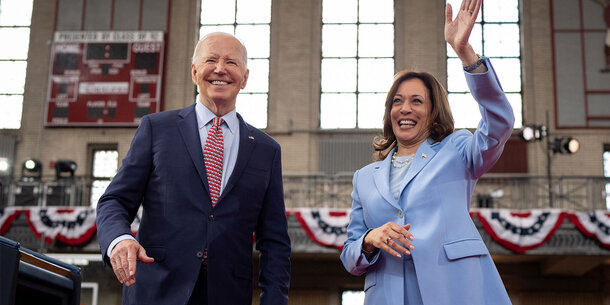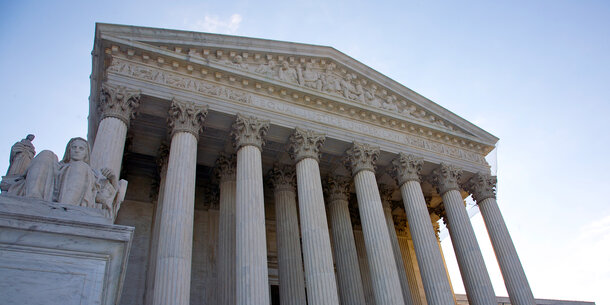Recognizing that the First Amendment does not give elected officials the right to accept bribes is at the core of almost any understanding of illegal public corruption. Yet Larry Householder, former speaker of the Ohio House of Representatives, is trying to convince a federal court that bribery is constitutionally protected. This argument, which Householder raised in a bid to overturn his conviction for taking bribes from a public utility company in exchange for a $1 billion bailout, is likely to lose. But the fact that he raised it at all reflects how deeply the Supreme Court has chipped away at anticorruption protections in favor of a cynical view that corruption is an unavoidable part of politics.
Householder’s case has rocked Ohio politics. He was convicted last year for a scheme to pass a billion-dollar taxpayer-subsidized power plant bailout through the Ohio legislature in exchange for more than $60 million in contributions to a dark money nonprofit group he ran called Generation Now. FirstEnergy Corporation, the Ohio electric utility that received the bailout, admitted that these payments were bribes, and prosecutors at trial showed that Householder used more than $500,000 for his personal benefit, including to pay his credit card debt, property taxes, and repairs to his Florida vacation home.
Despite these facts, Householder is appealing his conviction to the Sixth Circuit Court of Appeals. Invoking Supreme Court decisions in cases like Citizens United v. FEC and McCutcheon v. FEC that eviscerated campaign finance rules, Householder argues that the bribes he accepted were constitutionally protected campaign contributions — just politics as usual.
This argument is flatly wrong and unlikely to prevail even with the current Supreme Court. In a brief the Brennan Center filed on Friday alongside the Campaign Legal Center and Environmental Law and Policy Center, we explain just how misguided it is.
It’s true that the Supreme Court has struck down several campaign finance laws on First Amendment grounds, reasoning that money spent on political expenditures is a form of speech. But the laws at issue in those cases, including Citizens United and McCutcheon, were prophylactic — designed to reach beyond the prosecution of corruption to prevent it before it occurs. Because the Court wasn’t convinced that actual quid pro quos flowed from the types of campaign expenditures those laws prohibited, the Court held that there wasn’t a valid justification for the restrictions they placed on speech.
Householder’s case is fundamentally different because the corrupt deal already happened. This isn’t a case where prosecutors worried that campaign payments might lead to corruption. Nor did Householder merely sell the type of “ingratiation and access” the Court condoned in McCutcheon. Instead, he sold a specific act — pushing the power plant bailout through the legislature — in exchange for millions of dollars. This type of dollars-for-official-action exchange is the definition of quid pro quo corruption, which has never been protected under the Constitution.
This should be an easy case for the Sixth Circuit to decide. The judges should unanimously affirm Householder’s conviction and reject his warped interpretation of the First Amendment.
But courts have recently botched other cases that should have been just as easy, including the Supreme Court just a few months ago in Snyder v. United States. In that case, James Snyder, the former mayor of Portage, Indiana, was convicted for accepting thousands of dollars in kickbacks in exchange for steering a city contract worth $1 million to a local truck dealership. The federal law he was convicted under had long been understood to criminalize both the knowing acceptance of bribes (payments in exchange for a future decision) and gratuities (payments to reward past actions). Indeed, Snyder’s own lawyers conceded that the statute could encompass the gratuity payments he received. But the Court’s conservative majority — justices who all claim to adhere to textualism and originalism — jettisoned the plain text of the statute in favor of what Justice Ketanji Brown Jackson’s dissent called an “absurd and atextual reading” that the prohibition applies only to bribes, not gratuities.
It’s not that the Court is entirely wrong to be wary of prosecutorial overreach in the realm of politics. Criminal anticorruption laws are a heavy hammer, and occasionally, prosecutors have tried to use them to penalize conduct that, while distasteful, was not clearly illegal.
Too often, however, the Court’s wariness has tipped over into outright cynicism that questions the basic ideal of public service as a public trust that should not be used for personal self-enrichment. This apparent hostility toward even reasonable efforts to police corruption creates an environment that emboldens bad behavior from public officials. Decisions like Citizens United and Snyder — not to mention the Court’s shocking presidential immunity ruling — send a signal to would-be corrupt officials that they can conduct their schemes with impunity.
Against this backdrop, it is unsurprising to see defendants like Householder raising long-shot arguments that distort precedent and challenge established law. But Householder’s appeal represents a radical escalation that seeks to enshrine a right to accept bribes in the First Amendment. No such right has ever existed under U.S. law, and the Sixth Circuit should have no trouble reaffirming the principle at the heart of anticorruption law that taking money in exchange for official acts is illegal.





